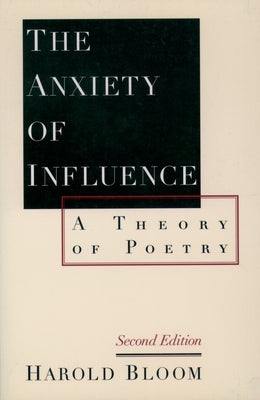Oxford University Press, USA
The Anxiety of Influence: A Theory of Poetry, 2nd Edition
The Anxiety of Influence: A Theory of Poetry, 2nd Edition
Regular price
$21.99 USD
Regular price
Sale price
$21.99 USD
Unit price
per
Shipping calculated at checkout.
Couldn't load pickup availability
Harold Bloom's The Anxiety of Influence has cast its own long shadow of influence since it was first published in 1973. Through an insightful study of Romantic poets, Bloom puts forth his central vision of the relations between tradition and the individual artist. Although Bloom was never the
leader of any critical camp, his argument that all literary texts are a response to those that precede them had an enormous impact on the practice of deconstruction and poststructuralist literary theory in this country. The book remains a central work of criticism for all students of literature
and has sold over 17,000 copies in paperback since 1984. Written in a moving personal style, anchored by concrete examples, and memorably quotable, Bloom's book maintains that the anxiety of influence cannot be evaded--neither by poets nor by responsible readers and critics.
This second edition contains a new Introduction, which explains the genesis of Bloom's thinking and the subsequent influence of the book on literary criticism of the past twenty years.criticism of the past twenty years. Here, Bloom asserts that the anxiety of influence comes out of a complex act
of strong misreading, a creative interpretation he calls poetic misprision. The influence-anxiety does not so much concern the forerunner but rather is an anxiety achieved in and by the story, novel, play, poem, or essay. In other words, without Keats's reading of Shakespeare, Milton, and
Wordsworth, we could not have Keats's odes and sonnets and his two Hyperions.
Given the enormous attention generated by Bloom's controversial The Western Canon, this new edition is certain to find a readymade audience among the new generation of scholars, students, and layreaders interested in the Bloom cannon.
Author: Harold Bloom
Publisher: Oxford University Press, USA
Published: 04/10/1997
Pages: 208
Binding Type: Paperback
Weight: 0.41lbs
Size: 8.03h x 5.33w x 0.43d
ISBN: 9780195112214
leader of any critical camp, his argument that all literary texts are a response to those that precede them had an enormous impact on the practice of deconstruction and poststructuralist literary theory in this country. The book remains a central work of criticism for all students of literature
and has sold over 17,000 copies in paperback since 1984. Written in a moving personal style, anchored by concrete examples, and memorably quotable, Bloom's book maintains that the anxiety of influence cannot be evaded--neither by poets nor by responsible readers and critics.
This second edition contains a new Introduction, which explains the genesis of Bloom's thinking and the subsequent influence of the book on literary criticism of the past twenty years.criticism of the past twenty years. Here, Bloom asserts that the anxiety of influence comes out of a complex act
of strong misreading, a creative interpretation he calls poetic misprision. The influence-anxiety does not so much concern the forerunner but rather is an anxiety achieved in and by the story, novel, play, poem, or essay. In other words, without Keats's reading of Shakespeare, Milton, and
Wordsworth, we could not have Keats's odes and sonnets and his two Hyperions.
Given the enormous attention generated by Bloom's controversial The Western Canon, this new edition is certain to find a readymade audience among the new generation of scholars, students, and layreaders interested in the Bloom cannon.
Author: Harold Bloom
Publisher: Oxford University Press, USA
Published: 04/10/1997
Pages: 208
Binding Type: Paperback
Weight: 0.41lbs
Size: 8.03h x 5.33w x 0.43d
ISBN: 9780195112214
About the Author
Harold Bloom is Sterling Professor of the Humanities at Yale University and Berg Professor of English at New York University. He is the author of numerous publications including A Map of Misreading, Yeats, The Book of J, The American Religion, The Western Canon, and Omens of the Millennium.
This title is not returnable


